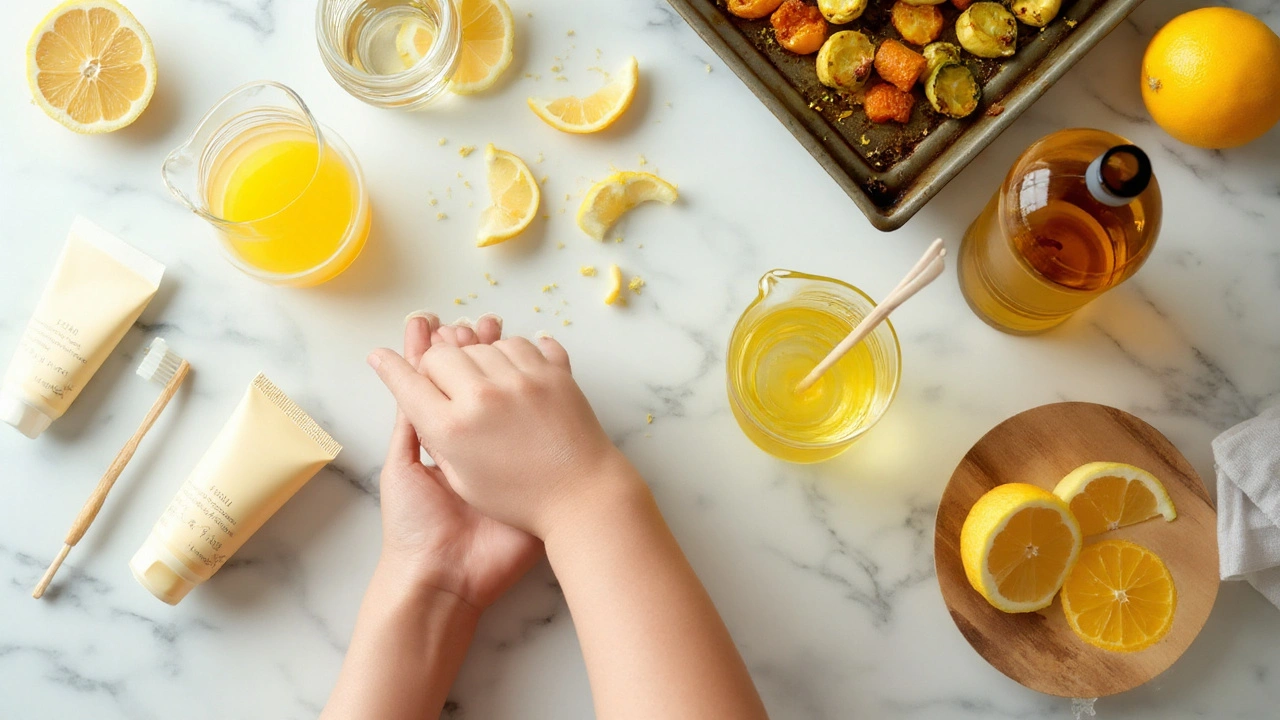You see lemon wedges at every cafe and in half the water bottles at the gym. The wellness world also sells it back to you as powders, capsules, and drops. So what’s true, what’s marketing, and how do you actually use lemon to get real health wins? Here’s the short answer: lemon can help with kidney stone prevention, iron absorption, and general vitamin C intake, but the magic fades fast when claims drift into detox cures or fat-burning miracles. If you want practical, evidence-backed ways to bring lemon into your routine-without wrecking your teeth or your gut-you’re in the right place.
TL;DR: What’s real about lemon as a supplement in 2025
- Lemon helps in three areas with good evidence: boosting non-haem iron absorption with meals, supporting citrate for kidney stone prevention, and topping up vitamin C. It’s not a detox cure.
- Typical daily use: 1-3 lemons worth of juice (30-120 mL) in water across the day, preferably with meals. For kidney stone prevention, studies often use ~60-120 mL of lemon juice daily diluted in 1-2 L of water.
- Teeth matter: acidic drinks can erode enamel. Use a straw, drink with meals, rinse with plain water, and wait 30 minutes before brushing.
- Supplements aren’t all equal. Fresh juice delivers vitamin C and citric acid. Powder can be convenient. “Citrus bioflavonoid” capsules focus on compounds like hesperidin/eriocitrin-not vitamin C. Lemon essential oil is for aroma, not swallowing.
- In Australia, look for TGA-listed products (AUST L) when buying capsules or powders. If you’ve got reflux, go slow or pick buffered vitamin C instead.
What the science actually says (and doesn’t)
Vitamin C and immunity: Lemon is a modest source of vitamin C. One medium lemon gives roughly 15-30 mg from the juice and ~30 mg for the whole fruit with pulp (USDA composition data). The Australian NRVs set the RDI at 45 mg/day for adults (higher needs for smokers). Cochrane reviews on vitamin C and the common cold report that regular vitamin C doesn’t stop most people from catching colds, but it can shorten duration a bit-around 8% in adults. Lemon can help you reach your daily vitamin C target, but it’s not a shield against infections.
Iron absorption: This is where lemon shines. Classic meal studies (e.g., Hallberg et al., 1989) showed ascorbic acid boosts non-haem iron absorption by converting it into a more absorbable form. In practice: squeeze lemon on lentils, spinach, tofu, or oats to increase iron uptake. For vegetarians, this is low-effort, high-return. Think of lemon as an iron “amplifier,” not an iron source.
Kidney stone prevention: Citrus citrate helps prevent calcium oxalate stones by increasing urinary citrate, which binds calcium and reduces crystal formation. “Lemonade therapy” has been studied in people with low urinary citrate, with several urology papers (e.g., late 1990s-2000s Journal of Urology/Urology) showing that ~60-120 mL lemon juice per day, diluted in water, raises urinary citrate and may reduce recurrent stones. It’s not as potent as prescription potassium citrate, but it’s a practical adjunct for some people.
Blood sugar response: Acidity can slow gastric emptying and blunt post-meal glucose spikes. Small crossover studies have found that adding lemon juice to a high-carb meal reduces the postprandial glucose rise compared to water alone. The effect is mild to moderate and very meal-dependent, but if you pair lemon with carbs, you may notice steadier energy.
Flavonoids and metabolic health: Lemon brings citrus flavonoids like hesperidin and eriocitrin. Small randomized trials on citrus flavonoids (mostly in orange/bergamot; a few on lemon extracts) report improvements in lipid profiles and oxidative stress markers. Sample sizes are usually small, durations short, and results mixed. Good signals, not slam-dunk outcomes. If you’re chasing lipid improvements, diet and exercise remain the heavy lifters; citrus flavonoids are a possible assist.
Skin and collagen: Vitamin C is essential for collagen synthesis and wound repair. That’s settled science. But using lemon topically on skin can cause irritation and even phototoxic reactions-don’t do that. If you want skin support, do it through diet or a balanced vitamin C supplement, not by rubbing lemon on your face.
Nausea in pregnancy: Inhaled lemon aroma has reduced nausea in a small randomized trial in pregnant women (Iranian Red Crescent Med J, 2014). Sipping lemon water may help some people too, but evidence is stronger for ginger. If you’re pregnant, keep lemon intake moderate and skip ingesting essential oil.
Detox claims: Your liver and kidneys already do detox. Lemon doesn’t “flush toxins.” It encourages hydration, adds vitamin C and potassium, and may help citrate status. That’s useful enough without the mythology.
Bottom line on claims: Strongest evidence: iron absorption and citrate support. Moderate: small nudges to post-meal glucose. General support: vitamin C top-ups. Unsupported hype: detox, fat burning, miracle immunity.

How to use lemon like a supplement: forms, doses, and real routines
Think in use-cases. Do you want more vitamin C? Better iron absorption? Help with kidney stones? Or just a simple hydration habit you’ll stick to? Match the form and dose to your goal.
lemon dietary supplement
Fresh lemon juice (daily basics):
- Everyday wellness: 1 medium lemon in 300-500 mL water, 1-2 times per day, with meals. Easy way to hit a chunk of your vitamin C and keep up hydration.
- Iron booster: Add the juice of half to one lemon to plant-heavy meals (oats, lentils, beans, tofu, spinach, quinoa). Keep tea/coffee 60-90 minutes away-they block iron absorption.
- Blood sugar helper: 1-2 tablespoons (15-30 mL) lemon juice with a carb-heavy meal may soften the glucose spike. Pair with protein and fiber for a bigger effect.
For kidney stone prevention (citrate focus):
- Target: ~60-120 mL lemon juice per day (that’s about 2-4 medium lemons), diluted into 1-2 L of water. Sip across the day, preferably with meals.
- If you’ve had stones: Work with your doctor. Lemon helps, but it’s not a substitute for evaluation, a 24-hour urine study, or prescription citrate if you need it.
Powders and capsules:
- Freeze-dried lemon powder: Convenient travel option. Typical serving 2-5 g mixed in water. Vitamin C content varies-check the label. Choose products with a TGA listing (AUST L) if they’re sold as complementary medicines in Australia.
- Citrus bioflavonoid capsules: Labeled as “citrus bioflavonoids,” “hesperidin,” or “lemon extract/eriocitrin.” Common doses 500-1000 mg/day. These focus on polyphenols, not vitamin C. Many pair them with 200-500 mg vitamin C.
- Vitamin C + citrus bioflavonoids: A popular combo if you want both antioxidant support and polyphenols in one hit.
- Essential oil: Not for ingestion. It’s fine for diffuser/aroma. Cold-pressed lemon oil can cause phototoxicity on skin-avoid sun on treated areas for 12-24 hours.
Make-it-stick routines:
- Morning cue: Pre-fill a 1 L bottle with water, add 60 mL lemon juice, keep it on your desk. Finish by 3 p.m.
- Meal habit: Keep a small lemon squeezer on the bench. Squeeze over salads, fish, beans, and grains. Taste first, then salt-you’ll often need less salt.
- Iron-smart breakfast: Oats + berries + pumpkin seeds + lemon juice stirred in after cooking. Save coffee for mid-morning.
- Travel hack: Freeze lemon juice in ice cubes. Toss a cube into your water bottle. Or carry single-serve powder sachets.
| Form | Typical dose | Est. vitamin C | Est. citric acid | Key actives | Pros | Watch-outs |
|---|---|---|---|---|---|---|
| Fresh lemon juice | 30-120 mL/day | 15-60 mg | ~1.5-6 g | Vitamin C, citrate, flavonoids (low) | Whole-food, cheap, tastes good | Enamel erosion risk; reflux in some |
| Lemon water with pulp | 300-500 mL, 1-2x/day | 15-40 mg | ~1-3 g | Vitamin C, tiny pectin | Simple hydration habit | Same acid caveats as above |
| Freeze-dried lemon powder | 2-5 g/day | Varies by brand | Varies by brand | Vitamin C, flavonoids | Portable, consistent taste | Label variability; quality matters |
| Citrus bioflavonoid capsule | 500-1000 mg/day | Usually little to none | None | Hesperidin, eriocitrin | Polyphenol focus; no acid | Not a vitamin C source |
| Vitamin C + bioflavonoids | 200-500 mg C + 200-500 mg bioflavonoids | 200-500 mg | None | Ascorbic acid + citrus flavonoids | Broad antioxidant support | High-dose C may upset GI in some |
Numbers are ballpark. Actual vitamin C and citric acid vary by variety (Meyer vs Eureka), ripeness, and brand processing.
Safety, risks, and how to buy smart (with an Aussie lens)
Teeth first: Acidic drinks erode enamel over time. Dental studies point to frequent sipping of acidic beverages as the main risk-more than the total daily amount. Practical protection:
- Drink lemon water with meals, not as an all-day sipper.
- Use a straw and rinse your mouth with plain water after.
- Wait 30 minutes before brushing (acid softens enamel; brushing too soon can wear it down).
- If you’ve got sensitive teeth, switch to buffered vitamin C or use lemon less often.
Reflux/heartburn: Lemon can trigger symptoms. Test a small amount with food. If nights are troublesome, keep citrus to earlier meals. Buffered vitamin C (sodium ascorbate, calcium ascorbate) is gentler on the stomach.
Kidney considerations: Lemon juice adds citrate and is generally helpful against calcium oxalate stones. High-dose vitamin C supplements (think 1 g/day and up), on the other hand, may raise urinary oxalate in some people. Lemon is not high-dose vitamin C, but don’t layer everything at once without a plan.
Allergy and skin: Citrus allergy is uncommon but real. Oral symptoms include tingling or itching in the mouth. On skin, cold-pressed lemon oil can cause phototoxic reactions (think skin irritation or darkening) if you hit strong sun afterward.
Medication interactions: Grapefruit is the known enzyme disruptor (CYP3A4). Lemon doesn’t share grapefruit’s strong furanocoumarin load and isn’t a common interaction problem. Still, if you’re on narrow-therapeutic-index meds, mention citrus habits to your pharmacist.
Pregnancy and kids: Normal food amounts are fine. Lemon aroma may help nausea. Don’t ingest essential oils. For kids, dilute well and be extra mindful of teeth.
Quality and regulation (Australia): The TGA regulates complementary medicines. If you’re buying capsules or therapeutic powders, look for an AUST L number on the label. That means the product is listed and meets baseline quality and safety standards. Food products (like 100% lemon juice) follow food standards instead. Organic is a nice-to-have; rinsing and using the juice helps reduce any surface residues either way.
Practical buying checklist:
- Fresh: Choose firm, heavy lemons with thin, bright skin. Feel the weight-heavier usually means juicier.
- Juice: 100% lemon juice only. Scan for added sugars. If you’re sulphite-sensitive, check for preservatives.
- Powder/capsules: Prefer brands with transparent vitamin C and flavonoid content. In Australia, check for AUST L.
- Essential oil: For diffuser or scent only; not for drinking.
- Storage: Keep lemons at room temp for a week or refrigerate for longer. Freeze extra juice in ice trays.

FAQ and next steps (use-case playbooks and troubleshooting)
Does warm water make lemon “work better”? Not really. Temperature is about comfort. If warm helps you drink more, do it. Don’t use boiling water; it can dull the fresh flavour and may degrade some vitamin C.
Can lemon detox my body? No. It supports hydration and adds vitamin C and citrate. Your liver and kidneys do the detoxing.
Is bottled lemon juice okay? Yes, if it’s 100% lemon juice. Some have preservatives like sodium metabisulfite; avoid if you’re sensitive. Fresh usually tastes better, but bottled is consistent and handy.
How many lemons per day is reasonable? 1-3 medium lemons worth of juice is sensible for most adults if your teeth and stomach tolerate it-preferably with meals and water.
Can lemon replace a vitamin C tablet? Sometimes. Two medium lemons might cover the Australian adult RDI. If you need higher doses (e.g., targeted supplementation), you’ll likely need a vitamin C product.
Is zest useful? Yes. Lemon zest carries aromatic oils and some flavonoids. Grate it into yogurt, salads, and baked dishes. Avoid high heat if you want to preserve delicate aromas.
Does it help weight loss? No direct fat-burning effect. Indirect benefits come from better hydration, taste-driven lower salt use, and possibly gentler post-meal glucose swings when you combine lemon with balanced meals.
What about Melbourne seasons? In Australia, Eureka lemons are around most of the year. Meyer lemons peak in the cooler months and taste sweeter. Winter lemons often pack a brighter flavour and plenty of juice.
Is it bad for enamel if I drink it once a day? Risk climbs with frequency and sipping over long periods. Keep it with meals, use a straw, and rinse after. If you’ve got existing enamel wear, talk to your dentist.
Any food pairings to avoid? Tea and coffee around iron-rich plant meals. Give them a 60-90 minute buffer if you’re using lemon to boost iron absorption.
Next steps: quick playbooks
- If you’ve had calcium oxalate kidney stones: Ask your doctor for a 24-hour urine test. If citrate is low, try 60-120 mL lemon juice diluted across the day, plus higher fluid intake, less high-oxalate foods where needed, and adequate calcium from food. Re-test to see if it’s working.
- If you’re vegetarian or low in iron: Add lemon to iron-rich plant meals. Example: chickpea salad with lemon-tahini dressing; or tofu stir-fry finished with lemon. Keep coffee/tea away from those meals. Consider iron labs if you’re fatigued.
- If you want steadier energy after carbs: Combine 15-30 mL lemon juice with a protein-rich meal and fiber. Try sourdough + eggs + rocket + lemon, or quinoa + salmon + lemon-herb dressing.
- If you have reflux: Start tiny, always with food. If symptoms flare, switch to buffered vitamin C and get your citrus fix from zest on food rather than juice in water.
- If you travel a lot: Pack single-serve lemon powder or vitamin C + bioflavonoid tablets. Sip plain water on flights; add lemon once you land to protect teeth.
Troubleshooting:
- Tooth sensitivity after a week: Reduce frequency, drink only with meals, use a straw, rinse after. Swap some servings to buffered vitamin C.
- No change in iron labs: Check meal patterns-are tea/coffee or calcium-rich foods blocking absorption? Consider an iron supplement under guidance.
- Kidney stone recurrence: You might need prescription potassium citrate or a different strategy. Lemon alone isn’t enough for everyone.
- Stomach discomfort: Dilute more, reduce dose, or try lemon with food only. If it persists, stop and reassess.
Handy rules of thumb:
- One medium lemon yields ~30-45 mL juice.
- 120 mL juice per day is a typical “lemonade therapy” ceiling for citrate support-split doses and always dilute.
- Use lemon to enhance iron absorption at the meal, not hours later.
- Protect teeth: meal-timed, straw, rinse, wait to brush.
- AUST L on labels (Australia) signals a listed complementary medicine.
Cut through the hype and use lemon where it actually helps: iron absorption, citrate support, and simple hydration with a vitamin C nudge. Keep your dentist happy, watch your reflux, and choose products with clear labels. The rest is taste-and that’s a nice bonus.



Arpit Sinojia
Been using lemon water with meals since I moved to Delhi-no more kidney stones, and my iron levels finally normalized. Also, I squeeze it on my dal and sabzi like my grandma taught me. No supplements needed. Just real food, real habits.
Also, avoid bottled lemon juice here. Most are packed with sugar and preservatives. Fresh is cheap and easy to find.
And yeah, teeth? I rinse with water after. No big deal. Just don’t sip it all day like some trendy influencer.